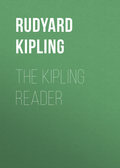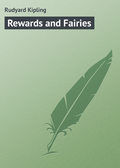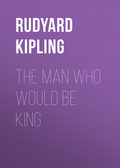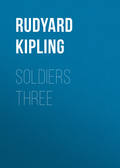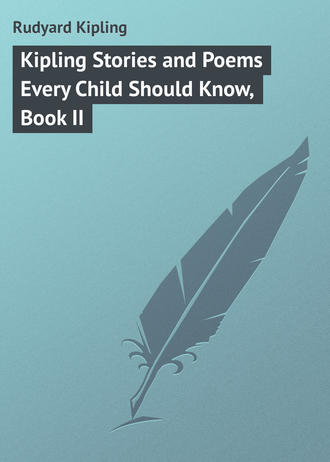
Редьярд Джозеф Киплинг
Kipling Stories and Poems Every Child Should Know, Book II
"There's sense in Mott yet," said Devlin. "E Company, double out to the river – sharp!"
So E Company, in its shirt-sleeves mainly, doubled for the dear life, and in the rear toiled the perspiring Sergeant, adjuring it to double yet faster. The cantonment was alive with the men of the 195th hunting for Wee Willie Winkie, and the Colonel finally overtook E Company, far too exhausted to swear, struggling in the pebbles of the river-bed.
Up the hill under which Wee Willie Winkie's Bad Men were discussing the wisdom of carrying off the child and the girl, a lookout fired two shots.
"What have I said?" shouted Din Mahommed. "There is the warning! The pulton are out already and are coming across the plain! Get away! Let us not be seen with the boy!"
The men waited for an instant, and then, as another shot was fired, withdrew into the hills, silently as they had appeared.
"The wegiment is coming," said Wee Willie Winkie confidently to Miss Allardyce, "and it's all wight. Don't cwy!"
He needed the advice himself, for ten minutes later, when his father came up, he was weeping bitterly with his head in Miss Allardyce's lap.
And the men of the 195th carried him home with shouts and rejoicings; and Coppy, who had ridden a horse into a lather, met him, and, to his intense disgust, kissed him openly in the presence of the men.
But there was balm for his dignity. His father assured him that not only would the breaking of arrest be condoned, but that the good-conduct badge would be restored as soon as his mother could sew it on his blouse-sleeve. Miss Allardyce had told the Colonel a story that made him proud of his son.
"She belonged to you, Coppy," said Wee Willie Winkie, indicating Miss Allardyce with a grimy forefinger. "I knew she did n't ought to go acwoss ve wiver, and I knew ve wegiment would come to me if I sent Jack home."
"You're a hero, Winkie," said Coppy – "a pukka hero!"
"I don't know what vat means," said Wee Willie Winkie, "but you must n't call me Winkie any no more. I'm Percival Will'am Will'ams."
And in this manner did Wee Willie Winkie enter into his manhood.
VI
THE DOVE OF DACCA
The freed dove flew to the Rajah's tower —
Fled from the slaughter of Moslem kings —
And the thorns have covered the city of Gaur.
Dove – dove – oh, homing dove!
Little white traitor, with woe on thy wings!
The Rajah of Dacca rode under the wall;
He set in his bosom a dove of flight —
"If she return, be sure that I fall."
Dove – dove – oh, homing dove!
Pressed to his heart in the thick of the fight.
"Fire the palace, the fort, and the keep —
Leave to the foeman no spoil at all.
In the flame of the palace lie down and sleep
If the dove, if the dove – if the homing dove
Come and alone to the palace wall."
The Kings of the North they were scattered abroad —
The Rajah of Dacca he slew them all.
Hot from slaughter he stooped at the ford,
And the dove – the dove – oh, the homing dove!
She thought of her cote on the palace wall.
She opened her wings and she flew away —
Fluttered away beyond recall;
She came to the palace at break of day.
Dove – dove – oh, homing dove!
Flying so fast for a kingdom's fall.
The Queens of Dacca they slept in flame —
Slept in the flame of the palace old —
To save their honour from Moslem shame.
And the dove – the dove – oh, the homing dove!
She cooed to her young where the smoke-cloud rolled.
The Rajah of Dacca rode far and fleet,
Followed as fast as a horse could fly,
He came and the palace was black at his feet;
And the dove – the dove – the homing dove,
Circled alone in the stainless sky.
So the dove flew to the Rajah's tower —
Fled from the slaughter of Moslem kings;
So the thorns covered the city of Gaur,
And Dacca was lost for a white dove's wings.
Dove – dove – oh, homing dove,
Dacca is lost from the roll of the kings!
VII
THE SMOKE UPON YOUR ALTAR DIES
(To whom it may concern.)
The smoke upon your Altar dies,
The flowers decay,
The Goddess of your sacrifice
Has flown away.
What profit, then, to sing or slay
The sacrifice from day to day?
"We know the Shrine is void," they said,
"The Goddess flown —
Yet wreaths are on the Altar laid —
The Altar-Stone
Is black with fumes of sacrifice,
Albeit She has fled our eyes.
"For it may be, if still we sing
And tend the Shrine,
Some Deity on wandering wing
May there incline;
And, finding all in order meet,
Stay while we worship at Her feet."
VIII
RECESSIONAL
The Recessional is one of the most popular poems of this century. It is a warning to age and a nation drunk with power, a rebuke to materialistic tendencies and boastfulness, a protest against pride.
"Reverence is the master-key of knowledge."
God of our fathers, known of old —
Lord of our far-flung battle-line —
Beneath whose awful Hand we hold
Dominion over palm and pine —
Lord God of Hosts, be with us yet
Lest we forget – lest we forget!
The tumult and the shouting dies —
The captains and the kings depart —
Still stands Thine ancient Sacrifice,
An humble and a contrite heart.
Lord God of Hosts, be with us yet,
Lest we forget – lest we forget!
Far-called our navies melt away —
On dune and headland sinks the fire —
Lo, all our pomp of yesterday
Is one with Nineveh and Tyre!
Judge of the Nations, spare us yet,
Lest we forget – lest we forget!
If, drunk with sight of power, we loose
Wild tongues that have not Thee in awe —
Such boasting as the Gentiles use
Or lesser breeds without the Law —
Lord God of Hosts, be with us yet,
Lest we forget – lest we forget!
For heathen heart that puts her trust
In reeking tube and iron shard —
All valiant dust that builds on dust,
And guarding calls not Thee to guard —
For frantic boast and foolish word,
Thy mercy on Thy People, Lord! Amen.
IX
L'ENVOI
When Earth's last picture is painted, and the tubes are twisted and dried,
When the oldest colours have faded, and the youngest critic has died,
We shall rest, and, faith, we shall need it – lie down for an æon or two,
Till the Master of All Good Workmen shall set us to work anew!
And those who were good shall be happy: they shall sit in a golden chair;
They shall splash at a ten-league canvas with brushes of comet's hair;
They shall find real saints to draw from – Magdalene, Peter, and Paul;
They shall work for an age at a sitting and never be tired at all!
And only the Master shall praise us, and only the Master shall blame;
And no one shall work for money, and no one shall work for fame;
But each for the joy of the working, and each, in his separate star,
Shall draw the Thing as he sees It for the God of Things as They Are!
I
THE SING-SONG OF OLD MAN KANGAROO
Not always was the Kangaroo as now we do behold him, but a Different Animal with four short legs. He was gray and he was woolly, and his pride was inordinate: he danced on an outcrop in the middle of Australia, and he went to the Little God Nqa at six before breakfast, saying, "Make me different from all other animals by five this afternoon."
Up jumped Nqa from his seat on the sandflat and shouted, "Go away!"
He was gray and he was woolly, and his pride was inordinate: he danced on a rockledge in the middle of Australia, and he went to the Middle God Nquing.
He went to Nquing at eight after breakfast, saying, "Make me different from all other animals; make me, also, wonderfully popular by five this afternoon."
Up jumped Nquing from his burrow in the spinifex and shouted, "Go away!"
He was gray and he was woolly, and his pride was inordinate: he danced on a sandbank in the middle of Australia, and he went to the Big God Nqong.
He went to Nqong at ten before dinner-time, saying, "Make me different from all other animals; make me popular and wonderfully run after by five this afternoon."
Up jumped Nqong from his bath in the salt-pan and shouted, "Yes, I will!"
Nqong called Dingo – Yellow-Dog Dingo – always hungry, dusty in the sunshine, and showed him Kangaroo. Nqong said, "Dingo! Wake up, Dingo! Do you see that gentleman dancing on an ash-pit? He wants to be popular and very truly run after. Dingo, make him so!"
Up jumped Dingo – Yellow-Dog Dingo – and said, "What, that cat-rabbit?"
Off ran Dingo – Yellow-Dog Dingo – always hungry, grinning like a coal-scuttle – ran after Kangaroo.
Off went the proud Kangaroo on his four little legs like a bunny.
This, O Beloved of mine, ends the first part of the tale!
He ran through the desert; he ran through the mountains; he ran through the salt-pans; he ran through the reed-beds; he ran through the blue gums; he ran through the spinifex; he ran till his front legs ached.
He had to!
Still ran Dingo – Yellow-Dog Dingo – always hungry, grinning like a rat-trap, never getting nearer, never getting farther – ran after Kangaroo.
He had to!
Still ran Kangaroo – Old Man Kangaroo. He ran through the ti-trees; he ran through the mulga; he ran through the long grass; he ran through the short grass; he ran through the Tropics of Capricorn and Cancer; he ran till his hind legs ached.
He had to!
Still ran Dingo – Yellow-Dog Dingo – hungrier and hungrier, grinning like a horse-collar, never getting nearer, never getting farther; and they came to the Wollgong River.
Now, there was n't any bridge, and there was n't any ferry-boat, and Kangaroo did n't know how to get over; so he stood on his legs and hopped.
He had to!
He hopped through the Flinders; he hopped through the Cinders; he hopped through the deserts in the middle of Australia. He hopped like a Kangaroo.
First he hopped one yard; then he hopped three yards; then he hopped five yards; his legs growing stronger; his legs growing longer. He had n't any time for rest or refreshment, and he wanted them very much.
Still ran Dingo – Yellow-Dog Dingo – very much bewildered, very much hungry, and wondering what in the world or out of it made Old Man Kangaroo hop.
For he hopped like a cricket; like a pea in a saucepan; or a new rubber ball on a nursery floor.
He had to!
He tucked up his front legs; he hopped on his hind legs; he stuck out his tail for a balance-weight behind him; and he hopped through the Darling Downs.
He had to!
Still ran Dingo – Tired Dog Dingo – hungrier and hungrier, very much bewildered, and wondering when in the world or out of it would Old Man Kangaroo stop.
Then came Nqong from his bath in the salt-pan, and said, "It's five o'clock."
Down sat Dingo – Poor Dog Dingo – always hungry, dusky in the sunshine; hung out his tongue and howled.
Down sat Kangaroo – Old Man Kangaroo – stuck out his tail like a milking-stool behind him, and said, "Thank goodness that's finished!"
Then said Nqong, who is always a gentleman, "Why are n't you grateful to Yellow-Dog Dingo? Why don't you thank him for all he has done for you?"
Then said Kangaroo – Tired Old Kangaroo – "He's chased me out of the homes of my childhood; he's chased me out of my regular meal-times; he's altered my shape so I'll never get it back; and he's played Old Scratch with my legs."
Then said Nqong, "Perhaps I'm mistaken, but didn't you ask me to make you different from all other animals, as well as to make you very truly sought after? And now it is five o'clock."
"Yes," said Kangaroo. "I wish that I had n't. I thought you would do it by charms and incantations, but this is a practical joke."
"Joke!" said Nqong from his bath in the blue gums. "Say that again and I'll whistle up Dingo and run your hind legs off."
"No," said the Kangaroo. "I must apologize. Legs are legs, and you need n't alter 'em so far as I am concerned. I only meant to explain to Your Lordliness that I've had nothing to eat since morning, and I'm very empty indeed."
"Yes," said Dingo – Yellow-Dog Dingo – "I am just in the same situation. I've made him different from all other animals; but what may I have for my tea?"
Then said Nqong from his bath in the salt-pan, "Come and ask me about it to-morrow, because I'm going to wash."
So they were left in the middle of Australia, Old Man Kangaroo and Yellow-Dog Dingo, and each said, "That's your fault."
This is the mouth-filling song
Of the race that was run by a Boomer,
Run in a single burst – only event of its kind —
Started by Big God Nqong from Warrigaborrigarooma,
Old Man Kangaroo first: Yellow-Dog Dingo behind.
Kangaroo bounded away,
His back-legs working like pistons —
Bounded from morning till dark,
Twenty-five feet to a bound.
Yellow-Dog Dingo lay
Like a yellow cloud in the distance —
Much too busy to bark.
My! but they covered the ground!
Nobody knows where they went,
Or followed the track that they flew in,
For that Continent
Had n't been given a name.
They ran thirty degrees,
From Torres Straits to the Leeuwin
(Look at the Atlas, please),
And they ran back as they came.
S'posing you could trot
From Adelaide to the Pacific,
For an afternoon's run —
Half what these gentlemen did —
You would feel rather hot
But your legs would develop terrific —
Yes, my importunate son,
You'd be a Marvellous Kid!
II
FUZZY-WUZZY
At the School Council Fuzzy-Wuzzy was elected Vice-President of Mr. Kipling's Poems, "because he was so brave."
(Soudan Expeditionary Force.)
We've fought with many men acrost the seas,
An' some of 'em was brave an' some was not:
The Paythan an' the Zulu an' Burmese;
But the Fuzzy was the finest o' the lot.
We never got a ha'porth's change of 'im:
'E squatted in the scrub an' 'ocked our 'orses,
'E cut our sentries up at Suakim,
An' 'e played the cat an' banjo with our forces.
So 'ere's to you, Fuzzy-Wuzzy, at your 'ome in the Sowdan;
You 're a poor benighted 'eathen, but a first-class fightin' man;
We gives you your certifikit, an' if you want it signed,
We'll come an' 'ave a romp with you whenever you're inclined.
We took our chanst among the Khyber hills,
The Boers knocked us silly at a mile,
The Burman guv us Irriwaddy chills,
An' a Zulu impi dished us up in style;
But all we ever got from such as they
Was pop to what the Fuzzy made us swaller;
We 'eld our bloomin' own, the papers say,
But man for man the Fuzzy knocked us 'oller.
Then 'ere's to you, Fuzzy-Wuzzy, an' the missis an' the kid,
Our orders was to break you, an' of course we went an' did.
We sloshed you with Martinis, an' it was n't 'ardly fair;
But for all the odds agin you, Fuzzy Wuz, you bruk the square.
'E 'as n't got no papers of 'is own,
'E 'as n't got no medals nor rewards,
So we must certify the skill 'e 's shown
In usin' of 'is long two-'anded swords;
When 'e 's 'oppin' in an' out among the bush
With 'is coffin-headed shield an' shovel-spear,
A 'appy day with Fuzzy on the rush
Will last a 'ealthy Tommy for a year.
So 'ere 's to you, Fuzzy-Wuzzy, an' your friends which is no more,
If we 'ad n't lost some messmates we would 'elp you to deplore;
But give an' take 's the gospel, an' we'll call the bargain fair,
For if you 'ave lost more than us, you crumpled up the square!
'E rushes at the smoke, when we let drive,
An', before we know, 'e 's 'ackin' at our 'ead;
'E 's all 'ot sand an ginger when alive,
An' 'e 's generally shammin' when 'e 's dead.
'E 's a daisy, 'e 's a duck, 'e 's a lamb!
'E 's a Injun-rubber idiot on the spree,
'E 's the on'y thing that does n't care a clam
For the Regiment o' British Infantree.
So 'ere's to you, Fuzzy-Wuzzy, at your 'ome in the Sowdan;
You 're a pore benighted 'eathen but a first-class fightin' man;
An' 'ere's to you, Fuzzy-Wuzzy, with your 'ayrick 'ead of 'air —
You big black boundin' beggar – for you bruk a British square.
III
THE ENGLISH FLAG
Above the portico the Union Jack remained fluttering in the flames for some time, but ultimately when it fell the crowds rent the air with shouts, and seemed to see significance in the incident. —Daily Papers.
Winds of the World, give answer? They are whimpering to and fro —
And what should they know of England who only England know? —
The poor little street-bred people that vapour and fume and brag,
They are lifting their heads in the stillness to yelp at the English Flag!
Must we borrow a clout from the Boer – to plaster anew with dirt?
An Irish liar's bandage, or an English coward's shirt?
We may not speak of England; her Flag's to sell or share.
What is the Flag of England? Winds of the World, declare!
The North Wind blew: – "From Bergen my steel-shod vanguards go;
I chase your lazy whalers home from the Disko floe;
By the great North Lights above me I work the will of God,
That the liner splits on the ice-field or the Dogger fills with cod.
"I barred my gates with iron, I shuttered my doors with flame,
Because to force my ramparts your nutshell navies came;
I took the sun from their presence, I cut them down with my blast,
And they died, but the Flag of England blew free ere the spirit passed.
"The lean white bear hath seen it in the long, long Arctic night,
The musk-ox knows the standard that flouts the Northern Light:
What is the Flag of England? Ye have but my bergs to dare,
Ye have but my drifts to conquer. Go forth, for it is there!"
The South Wind sighed: – "From The Virgins my mid-sea course was ta'en
Over a thousand islands lost in an idle main,
Where the sea-egg flames on the coral and the long-backed breakers croon
Their endless ocean legends to the lazy, locked lagoon.
"Strayed amid lonely islets, mazed amid outer keys,
I waked the palms to laughter – I tossed the scud in the breeze —
Never was isle so little, never was sea so lone,
But over the scud and the palm-trees an English flag was flown.
"I have wrenched it free from the halliard, to hang for a wisp on the Horn;
I have chased it north to the Lizard – ribboned and rolled and torn;
I have spread its fold o'er the dying, adrift in a hopeless sea;
I have hurled it swift on the slaver, and seen the slave set free.
"My basking sunfish know it, and wheeling albatross,
Where the lone wave fills with fire beneath the Southern Cross.
What is the Flag of England? Ye have but my reefs to dare,
Ye have but my seas to furrow. Go forth, for it is there!"
The East Wind roared: – "From the Kuriles, the Bitter Seas, I come,
And me men call the Home-Wind, for I bring the English home.
Look – look well to your shipping! By the breath of my mad typhoon
I swept your close-packed Praya and beached your best at Kowloon!
"The reeling junks behind me and the racing seas before,
I raped your richest roadstead – I plundered Singapore!
I set my hand on the Hoogli; as a hooded snake she rose,
And I flung your stoutest steamers to roost with the startled crows.
"Never the lotos closes, never the wild-fowl wake,
But a soul goes out on the East Wind that died for England's sake —
Man or woman or suckling, mother or bride or maid —
Because on the bones of the English the English Flag is stayed.
"The desert-dust hath dimmed it, the flying wild-ass knows.
The scared white leopard winds it across the taint-less snows.
What is the Flag of England? Ye have but my sun to dare,
Ye have but my sands to travel. Go forth, for it is there!"
The West Wind called: – "In squadrons the thoughtless galleons fly
That bear the wheat and cattle lest street-bred people die.
They make my might their porter, they make my house their path,
Till I loose my neck from their rudder and whelm them all in my wrath.
"I draw the gliding fog-bank as a snake is drawn from the hole;
They bellow one to the other, the frightened ship-bells toll,
For day is a drifting terror till I raise the shroud with my breath,
And they see strange bows above them and the two go locked to death.
"But whether in calm or wrack-wreath, whether by dark or day,
I heave them whole to the conger or rip their plates away,
First of the scattered legions, under a shrieking sky,
Dipping between the rollers, the English Flag goes by.
"The dead dumb fog hath wrapped it – the frozen dews have kissed —
The naked stars have seen it, a fellow-star in the mist.
What is the Flag of England? Ye have but my breath to dare,
Ye have but my waves to conquer. Go forth, for it is there!"
IV
THE KING
Farewell, Romance!" the Cave-men said;
"With bone well carved he went away;
Flint arms the ignoble arrowhead,
And jasper tips the spear to-day.
Changed are the Gods of Hunt and Dance,
And he with these. Farewell, Romance!"
"Farewell, Romance!" the Lake-folk sighed;
"We lift the weight of flatling years;
The caverns of the mountain side
Hold him who scorns our hutted piers.
Lost hills whereby we dare not dwell,
Guard ye his rest. Romance, farewell!"
"Farewell, Romance!" the Soldier spoke;
"By sleight of sword we may not win,
But scuffle 'mid uncleanly smoke
Of arquebus and culverin.
Honour is lost, and none may tell
Who paid good blows. Romance, farewell!"
"Farewell, Romance!" the Traders cried;
"Our keels ha' lain with every sea;
The dull-returning wind and tide
Heave up the wharf where we would be;
The known and noted breezes swell
Our trudging sail. Romance, farewell!"
"Good-bye, Romance!" the Skipper said;
"He vanished with the coal we burn;
Our dial marks full steam ahead.
Our speed is timed to half a turn.
Sure as the tidal trains we ply
'Twixt port and port. Romance, good-bye!"
"Romance!" the Season-tickets mourn,
"He never ran to catch his train,
But passed with coach and guard and horn —
And left the local – late again!
Confound Romance!" … And all unseen
Romance brought up the nine-fifteen.
His hand was on the lever laid,
His oil-can soothed the worrying cranks,
His whistle waked the snow-bound grade,
His fog-horn cut the reeking Banks;
In dock and deep and mine and mill
The Boy-god reckless laboured still.
Robed, crowned and throned, he wove his spell,
Where heart-blood beat or hearth-smoke curled
With unconsidered miracle,
Hedged in a backward-gazing world:
Then taught his chosen bard to say:
"The King was with us – yesterday!"



